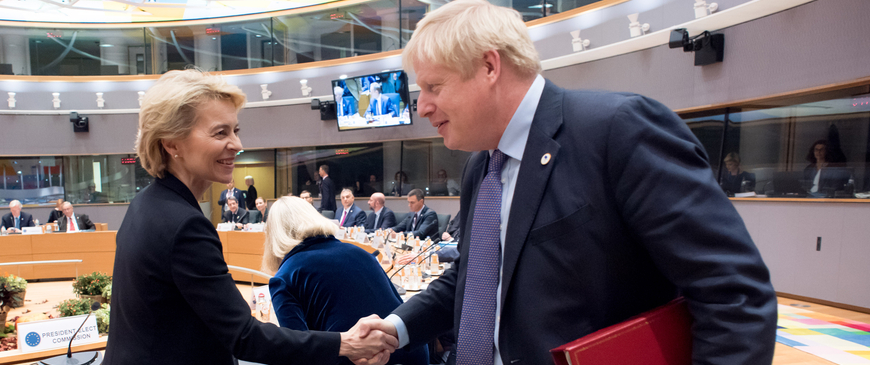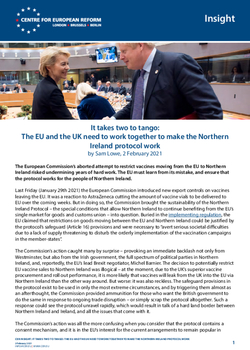
It takes two to tango: The EU and the UK need to work together to make the Northern Ireland protocol work
The European Commission’s aborted attempt to restrict vaccines moving from the EU to Northern Ireland risked undermining years of hard work. The EU must learn from its mistake, and ensure that the protocol works for the people of Northern Ireland.
Last Friday (January 29th 2021) the European Commission introduced new export controls on vaccines leaving the EU. It was a reaction to AstraZeneca cutting the amount of vaccine vials to be delivered to EU over the coming weeks. But in doing so, the Commission brought the sustainability of the Northern Ireland Protocol – the special conditions that allow Northern Ireland to continue benefiting from the EU’s single market for goods and customs union – into question. Buried in the implementing regulation, the EU claimed that restrictions on goods moving between the EU and Northern Ireland could be justified by the protocol’s safeguard (Article 16) provisions and were necessary to “avert serious societal difficulties due to a lack of supply threatening to disturb the orderly implementation of the vaccination campaigns in the member-states”.
While this time the threat to the Northern Ireland protocol emanated from Brussels, the UK’s recent past is far from unblemished - both have made mistakes, but there is now an opportunity for both to look to the future.
The Commission’s action caught many by surprise – provoking an immediate backlash not only from Westminster, but also from the Irish government, the full spectrum of political parties in Northern Ireland, and, reportedly, the EU’s lead Brexit negotiator, Michel Barnier. The decision to potentially restrict EU vaccine sales to Northern Ireland was illogical – at the moment, due to the UK’s superior vaccine procurement and roll out performance, it is more likely that vaccines will leak from the UK into the EU via Northern Ireland than the other way around. But worse: it was also reckless. The safeguard provisions in the protocol exist to be used in only the most extreme circumstances, and by triggering them almost as an afterthought, the Commission provided ammunition for those who want the British government to do the same in response to ongoing trade disruption – or simply scrap the protocol altogether. Such a response could see the protocol unravel rapidly, which would result in talk of a hard land border between Northern Ireland and Ireland, and all the issues that come with it.
The Commission’s action was all the more confusing when you consider that the protocol contains a consent mechanism, and it is in the EU’s interest for the current arrangements to remain popular in Northern Ireland. The consent mechanism means that in four years’ time, Northern Ireland will decide whether to remain subject to the protocol or not. If it is rejected, the protocol will cease to apply two years later. From an EU perspective, Northern Ireland’s rejection of the protocol would mean spending even more time, energy and political capital on the region, at a time when there is little available.
Thankfully, the UK’s response was measured, and the Commission quickly backed down under pressure from Ireland and others. One member-state politician described the mishap as an “accident”. That such provisions were allowed to slip through in the first place points to a wider problem: perhaps understandably, what happens in Northern Ireland is not front of mind for most Commission or member-state officials, especially in the middle of a global pandemic. But there do need to be more effective internal controls, to prevent a similar mistake happening in future. The current economic upheaval in Northern Ireland is a direct result of the UK’s decision to Brexit, and in particular of Great Britain’s exit of the EU’s customs union and single market. But in agreeing to the Northern Ireland protocol, the EU, too, has taken on continuing obligations to Northern Ireland. As such, future decision-making in Brussels needs to take into account any political and economic consequences for Northern Ireland, or risk undermining the hard-fought compromise it spent years negotiating.
While this time the threat to the Northern Ireland protocol emanated from Brussels, the UK’s recent past is far from unblemished. Last autumn, several clauses in the UK government’s Internal Market Bill threatened to unilaterally override elements of the already agreed protocol, in a misguided attempt to gain leverage over the EU in the broader trade talks. By doing so, the UK demonstrated that it was prepared to play fast and loose with its treaty commitments to Northern Ireland if it felt that doing so would serve a broader purpose. More recently, the refusal of senior UK ministers to be honest about the impact of the new customs and regulatory border between Great Britain and Northern Ireland – which the UK government decided on – has led to confusing government instructions and undermined business preparedness.
The EU and UK have both made mistakes, but there is now an opportunity for both to look to the future. To this effect, Michael Gove, the UK minister with responsibility for the implementation of the Northern Ireland protocol said "I've spoken to the European Commission vice-president Maros Šefčovič about this and we both agreed that we need a reset, that we need to put the people of Northern Ireland first."
The European Commission’s aborted attempt to restrict vaccines moving from the EU to Northern Ireland risked undermining years of hard work. The EU must learn from its mistake, and ensure that the protocol works for the people of Northern Ireland.
But even if Gove and Šefčovič really do use their best efforts to reset the relationship, there is a lot of damage to be undone. The EU’s apparent willingness to place controls on vaccines entering Northern Ireland has invariably emboldened those voices that are critical of the protocol. They argue that the ongoing disruption and difficulties facing businesses trying to bring goods into Northern Ireland from Great Britain means the UK should unilaterally tear up the protocol and start again. But while more needs to be done to assist businesses (as will be discussed later), those advocating the nuclear option should be ignored. The alternative to the protocol remains either the UK as a whole integrating more fully with the EU, or a customs and regulatory land border between Northern Ireland and Ireland. The former remains politically untenable for the UK government, and the latter something no one other than hard-line Northern Ireland unionists, and attention seeking backbench MPs, is willing to countenance. And if the issues currently being experienced by traders bringing goods into the port of Larne and elsewhere tell us anything, it is that claims that a land border between Northern Ireland and Ireland could be invisible and frictionless, thanks to so-called ‘alternative arrangements’, were always fanciful.
But it is true that the EU and UK need to work harder to make the new arrangements for Northern Ireland work well for its people. Since the start of the year there have been significant problems for goods entering Northern Ireland from Great Britain: Amazon has stopped delivering alcohol to consumers in Northern Ireland; fresh produce destined for supermarkets in Northern Ireland has been disrupted; and a number of products such as seed potatoes and soil have been banned from entering Northern Ireland entirely.
And disruption is about to get worse, when grace periods currently in place end. Until April 1st Northern Irish supermarket bringing in products of animal origin from Great Britain do not need to worry about export health certificates or border checks, and consumer parcels such as Amazon packages sent to Northern Ireland from Great Britain don’t require customs declarations. The EU also has also waived for six months the rules stating that uncooked prepared meat products such as sausages can only enter its regulatory territory (which Northern Ireland remains a de facto extension of) if they are frozen. Checks on pets entering Northern Ireland from Great Britain will begin from July 1st 2021.
While many of the new burdens faced by traders are simply a result of the UK government’s decision to prioritise regulatory flexibility for Great Britain over Northern Ireland’s economic integration with the UK, there are still measures that the EU could and should take to help ease concerns. The EU should agree to extend the grace period for supermarkets bringing products of animal origin into Northern Ireland from Great Britain without export health certificate for as long as UK food hygiene rules stay in lockstep. With the final point of sale being very clearly in Northern Ireland, there is no wider threat to the EU’s single market – and compliance can be enforced through audit if necessary. The EU should also consider permanent derogations specific to the island of Ireland (potentially only for registered suppliers such as supermarkets and garden centres) allowing for chilled meat products, seed potatoes, soil and the like to be imported without hassle from Great Britain. As a distinct biosphere, separate from the rest of the EU, such island-of-Ireland-specific rules for food and plant products would be justifiable.
The UK should also re-consider its decision to break completely free of EU rules, and re-enter into negotiations on an EU-UK veterinary agreement, similar to Switzerland’s. If successful, such an agreement would see the UK permanently bound to EU food hygiene rules. But the benefit is there would no longer be a need for export health certificates or arduous checks on products of animal origin entering Northern Ireland (and anywhere else in the EU) from Great Britain. Such constrains would restrict the UK’s ability to accept American food standards as part of a future UK-US trade deal, for example, but would significantly reduce trade friction both within the UK, and with the EU, to the benefit of UK farmers.
The EU has already shown a lot of flexibility on issues affecting Northern Ireland, allowing it to retain a foothold in the EU’s market without the obligations normally asked of countries seeking a similar status. Now it is in the bloc’s interest to show a little more. Businesses in Northern Ireland will eventually adapt to the new trading conditions, and possibly even benefit from having greater access to European consumers than their counterparts in Great Britain. But in the meantime, while staunch Northern Ireland unionists will never be happy, the UK and EU must work together to ensure that the new normal is tolerable for everyone else, at the very least. And please, no more accidents.
Sam Lowe is a senior research fellow at the Centre for European Reform.


Add new comment